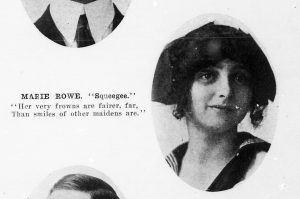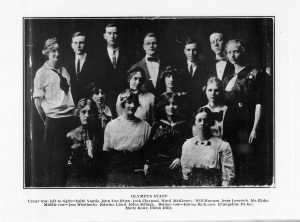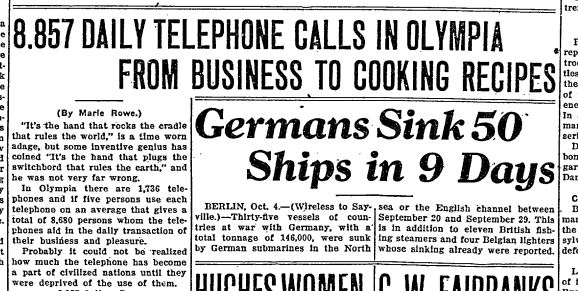You never know what the future may hold. “Though your name be unknown and not on the map,” wrote student Marie Rowe in her class poem for the 1914 graduates of Olympia High School, “We have faith in the common sense under your cap./May our acts be so noble, so upright and true/That they will always reflect honor on the dear old white and blue.” Marie herself, ironically, would soon become famous—under a pen name.

Marie Gladys Rowe was born in 1895 to Asa and Lizzie Rowe in Lacey, then known as Woodland. Her lumberman father was involved with Woodland Driving Park, a horse racetrack. Marie was actually born in the clubhouse, which became the Woodland/Lacey Hotel. Asa later served as a Thurston County commissioner.
Marie attended Olympia High School, graduating in 1914. She was on the editorial team of the school’s yearbook, the Olympus. Marie enrolled at the University of Washington to study journalism, attending from 1914 to 1916. It is not clear if she formally graduated. Marie was a member of the Delta Delta Delta sorority and even sent columns of University of Washington news back to the Olympia papers, updating readers about local people studying at the school.
Returning to Olympia, Marie became a copy editor and wrote articles for the Olympia Daily Recorder, a local newspaper. While picking up some papers from the Capitol (now SPI Building), she saw logger John Van Dell running away after shooting Insurance Commissioner E. W. Olson, angry that the commission had not ruled in favor of his application for aid. After he surrendered to the police, Marie interviewed him.

Shocked at how late she was, her boss was furious. “Where are those papers?” she quoted him as saying decades later, “How long does it take to get that done?” “Oh that,” Marie replied. “Actually, I was out covering a shooting.”
Marie’s duties at the newspaper increased. It is impossible to know everything she wrote because the paper only gave her a by-line for some of her society articles. These included a children’s opera performance at the Woman’s Club of Olympia, a “grocery ball” food show put on by local retailers and how to buy Liberty Bonds.
Beyond her job, Marie was active in Olympia organizations. She was secretary of the Thurston County Humane Society in 1917—her mother-in-law was president—and was a founding member of the Olympia chapter of the Business and Professional Woman’s Club in 1920. Marie also wrote for the Tacoma News.
On August 12, 1917, Marie married John Dunbar, while he was awaiting his orders after enlisting in the navy. Son of a State Supreme Court justice, John would serve as attorney general of Washington from 1923 to 1933. They had one daughter, Dorothy, who was born in 1922 and died in 1970. Marie and John divorced in 1924 and she retained custody of her daughter. In 1929 Marie married Joseph Newberger, vice president of Seattle First National Bank.
Marie moved to Seattle where she continued writing for newspapers. She covered crime, politics, and features—unusual topics for a woman reporter at the time. In 1933 she became Society editor at the Seattle Times. For that, she created a pen name.
Reflecting years later, her remembered that since she had no name ideas, her editor suggested she combine historically significant Seattle street names. So, she came up with 20 combinations and he selected “Virginia Boren.” The name stuck.
As Virginia Boren, Marie wrote extensively about literature, social events, clubs and her travels. Marie traveled around the world. She wrote many articles about her trips, including to Hawaii and a cruise that saw her visiting the Panama Canal Zone, Havana and New Orleans.

Besides working for the paper, Marie was active in Seattle life. She served as a board member of both the Seattle Day Nursery and the Community Nursing Service. She also belonged to the Daughters of the American Revolution. Still, Marie maintained ties to Olympia. When she spoke on KJR Radio on August 31, 1932 the Daily Olympian commented that “Mrs. Newberger has a host of friends in Olympia interested in her radio appearance.” In January 1941 she gave a talk to the Zonta Club at the Hotel Olympian.
In 1942 Marie divorced Joseph and moved to New York. While working at the National Fats Salvage campaign offices she met and soon married Courtney Terrett, a newspaper man, foreign correspondent and former Hollywood screenwriter. Marie continued writing for newspapers and national magazines as a freelance writer and doing public relations.
In 1957, after Courtney died, Marie married M. H. Towle, division manager of Marshall Field Enterprises, Inc. (Minnesota) in St. Paul. She had been his private secretary and assistant state director. Marie continued writing and helped her husband do research for a book that she completed and published in 1966 under the name Virginia Rowe Towle. The book, “Vigilante Woman” is about notable women during the vigilante era of early territorial Montana.
Towle died in September 1966. That December, Marie visited Seattle to promote her book. She told reporters, in an article published in the Seattle Times on December 7, about her long career and hopes for the future. She was writing a second book and researching clowns for a third.
Marie Dunbar moved to South Bend, Indiana to live with her daughter and passed away in Salt Lake City, Utah on October 1, 1983. Marie’s life saw many changes as her career evolved. Reflecting on the changing newspaper business, she told the Seattle Times in 1966 that writing news was, “A real business now. In those [earlier] days it was kind of a slap-happy, opportunistic game.” And one that she was good at.



















































